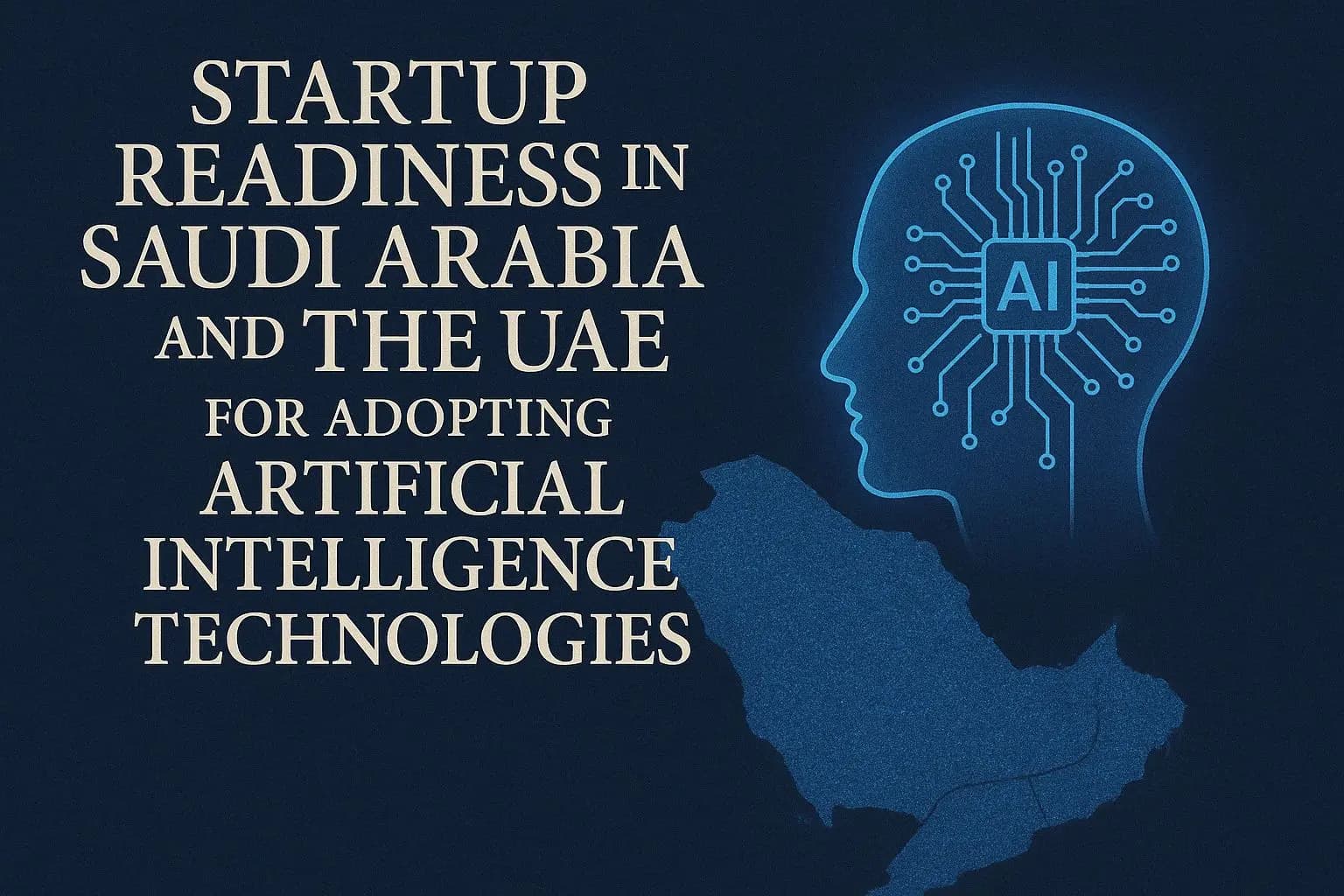Abstract
The world is witnessing a technological revolution led by artificial intelligence (AI), with Saudi Arabia and the United Arab Emirates (UAE) emerging as prominent regional and international hubs for adopting these technologies. This paper examines the readiness of startups in both countries to adopt AI by analyzing the entrepreneurial environment, technological infrastructure, availability of skilled personnel, funding, and regulatory frameworks. It also highlights key sectors where AI adoption has increased, provides real-world examples of startups successfully employing AI, discusses major challenges, and concludes with recommendations for enhancing this readiness.
Keywords: Artificial Intelligence, Saudi Arabia, UAE, Startups, Digital Innovation.
Introduction
The world today is experiencing a transformative technological revolution driven predominantly by Artificial Intelligence (AI). Saudi Arabia and the UAE have established themselves as key regional and global centers for the adoption of these cutting-edge technologies. Both countries have made significant investments in digital infrastructure, education, and innovation to diversify their economies in alignment with national development visions such as Saudi Vision 2030 and UAE’s futuristic strategies.
This research paper evaluates the readiness of startups in Saudi Arabia and the UAE for adopting AI technologies. It starts by providing an overview of the entrepreneurial environment in both countries, examines governmental support, and assesses startup readiness regarding technological infrastructure, human skills availability, funding, and regulatory frameworks. The paper then explores key sectors increasingly adopting AI, provides real-world examples of successful startups leveraging AI, discusses the primary challenges faced, and concludes with strategic recommendations.
1. Entrepreneurial Environment and Government Support in Saudi Arabia and the UAE
1.1 Saudi Arabia's Entrepreneurial Environment and Government Role
Saudi Arabia has experienced a significant rise in entrepreneurship, driven by Vision 2030 aimed at economic diversification. The government has established enabling entities and programs such as the Small and Medium Enterprises General Authority (Monsha'at), Saudi Venture Capital Company (SVC), and accelerators such as Misk 500 and Flat6Labs Riyadh. In 2023, Saudi startups secured a record $1.38 billion in funding, boosted notably by substantial investments from the Public Investment Fund (PIF). During LEAP 2025, Saudi Arabia announced more than $14.9 billion in investments dedicated to supporting AI infrastructure.
Specialized authorities, such as the Saudi Data and AI Authority (SDAIA), have been established and launched the National Strategy for Data and AI, aiming to position Saudi Arabia among the top 15 AI countries by 2030.
1.2 UAE’s Entrepreneurial Environment and Government Role
The UAE adopted a proactive approach to support startups through initiatives such as Dubai Future Accelerators and technology free-zones like Hub71. By 2023, the UAE startup ecosystem was valued at approximately $23 billion, hosting over 5,600 startups, especially prominent in fintech. Additionally, the UAE launched the National AI Strategy 2031, aiming for AI to contribute nearly $91 billion to its economy.
The UAE also founded the Mohamed bin Zayed University of Artificial Intelligence (MBZUAI), fostering advanced research, and invested heavily in cloud infrastructure, partnering with major tech firms like G42, Amazon, and Microsoft.
2. Assessing Startup Readiness for Adopting AI Technologies
2.1 Technological Infrastructure
Both countries provide robust digital infrastructure. Saudi Arabia integrated governmental data centers into a unified national cloud. The UAE boasts widespread 5G connectivity and major cloud providers, in addition to innovation labs such as Aramco’s Fourth Industrial Revolution Center.
2.2 Human Skills and Training
Saudi Arabia and the UAE have significantly invested in education and specialized training to produce qualified talent. Saudi Arabia collaborated with global corporations like Google and Amazon, while the UAE launched initiatives such as the "One Million Arab Coders" program and established MBZUAI to offer free advanced AI education.
2.3 Funding and Investment
Both countries have strong funding ecosystems for startups through entities like Saudi Arabia’s Public Investment Fund (PIF) and UAE’s BECO Capital. However, projects requiring long-term investment still face funding challenges.
2.4 Regulatory and Legislative Environment
Saudi Arabia and the UAE have developed modern regulatory frameworks to encourage AI innovation, such as e-commerce regulations, data protection laws, and fintech sandboxes, providing startups an opportunity to test new technologies.
3. Prominent Sectors Adopting AI
Key sectors include:
- Financial Technology (FinTech): Startups like "Sulfah," "Tamara," and "Tabby" in Saudi Arabia; and "Sarwa" in the UAE.
- Healthcare and Digital Health: Companies such as "Cura" in Saudi Arabia and "AppliedAI" in the UAE.
- Education Technology (EdTech): Platforms like "Noon Academy" in Saudi Arabia and "Alef Education" in the UAE.
- E-Commerce and Logistics: Firms like "Jahez" in Saudi Arabia and "Taffi" in the UAE.
4. Real-world Examples of Gulf Startups Utilizing AI
- Mozn (Saudi Arabia): AI-driven financial crime detection solutions.
- Sarwa (UAE): Robo-advisor platform for automated investment management.
- Noon Academy (Saudi Arabia): AI-enhanced online educational platform.
- Alef Education (UAE): Adaptive learning platform using AI for personalized education.
- Jahez (Saudi Arabia): AI-based demand prediction and optimized logistics.
5. Major Challenges Facing Startups in AI Adoption
6. Recommendations for Enhancing AI Readiness and Adoption
- Enhance specialized training programs in AI and data sciences.
- Provide open datasets and experimental sandboxes for startups.
- Launch specialized investment funds targeting deep-tech AI startups.
- Continuously update regulatory frameworks through participatory policymaking.
- Increase community awareness and trust-building campaigns.
- Facilitate industry collaboration to integrate AI solutions with existing systems.
- Promote regional integration among Gulf countries for collaborative AI innovation.
- Establish national KPIs to regularly measure and report on AI adoption progress.
Conclusion
This paper demonstrates that startups in Saudi Arabia and the UAE have considerable readiness to adopt AI technologies, backed by strong government support and advanced infrastructure. However, persistent challenges such as talent shortages, data availability, infrastructure investment costs, and regulatory constraints must be systematically addressed.
Complete AI readiness demands coordinated efforts from governments, private sectors, academia, and tech communities. Implementing the outlined recommendations can further elevate Saudi Arabia and the UAE’s positions as leading global innovation hubs, thereby enhancing their competitiveness in a knowledge-driven digital economy. Investing in AI adoption is not merely strategic but an imperative to meet global transformations and achieve sustainable economic growth.
References
